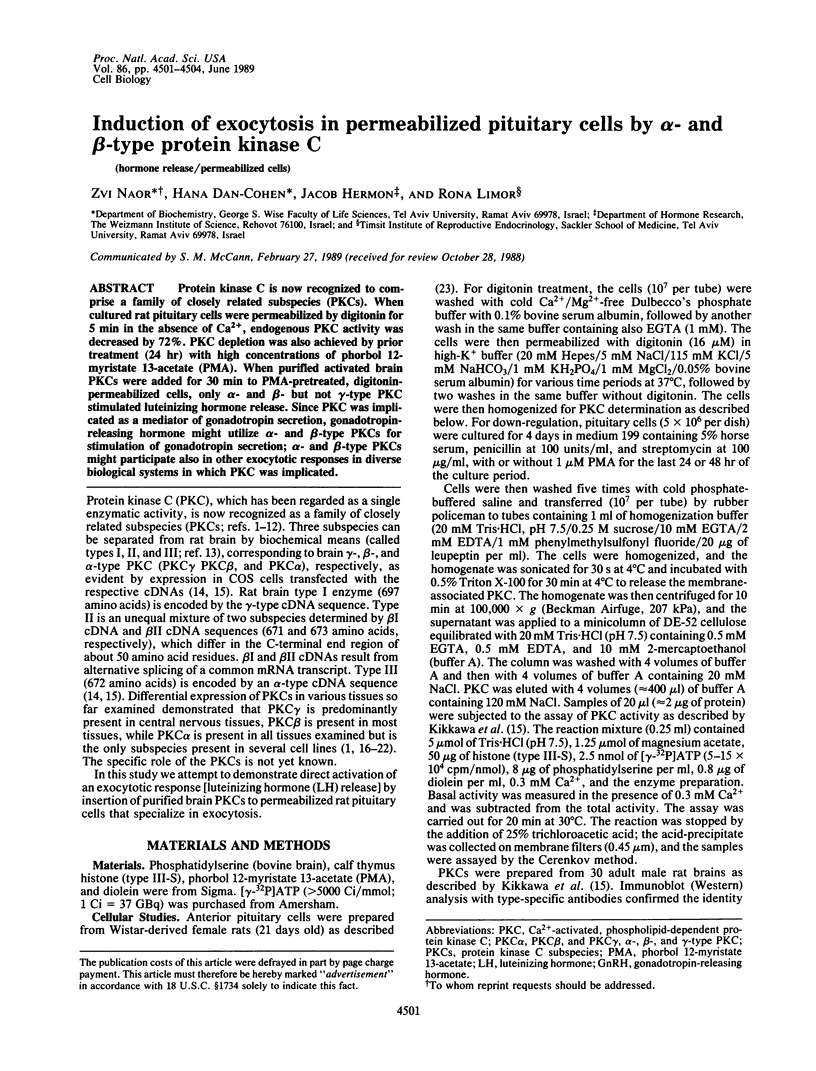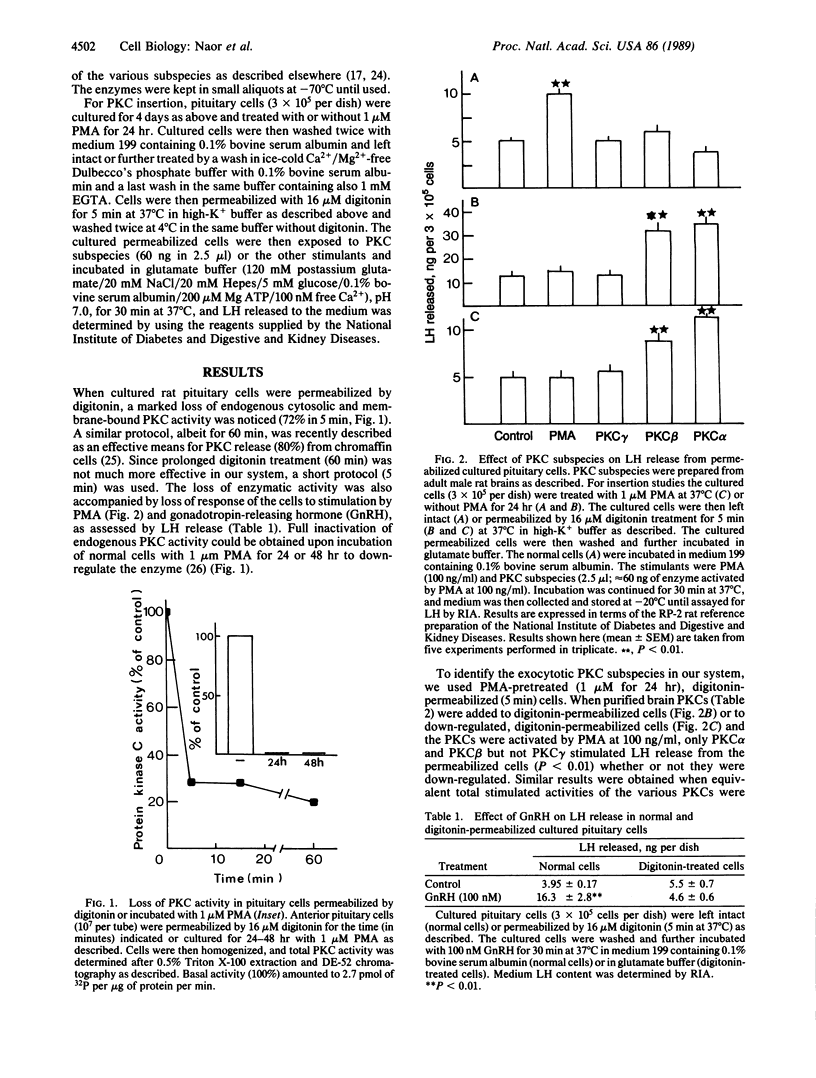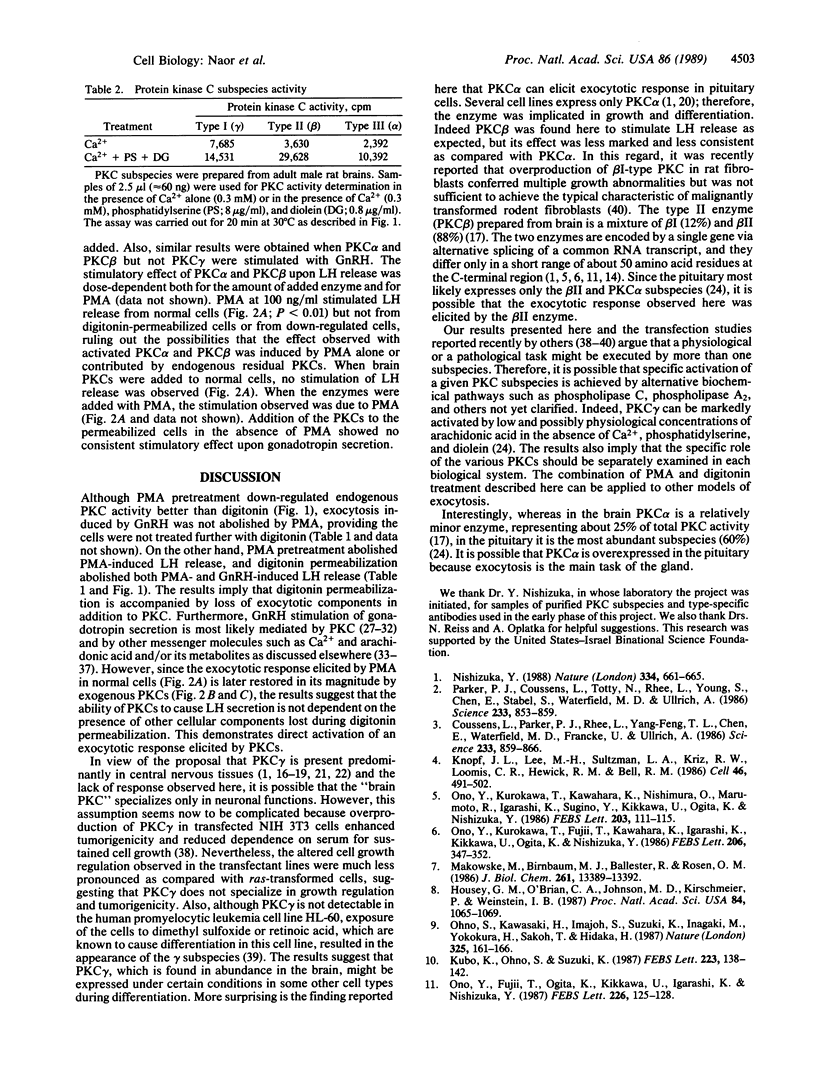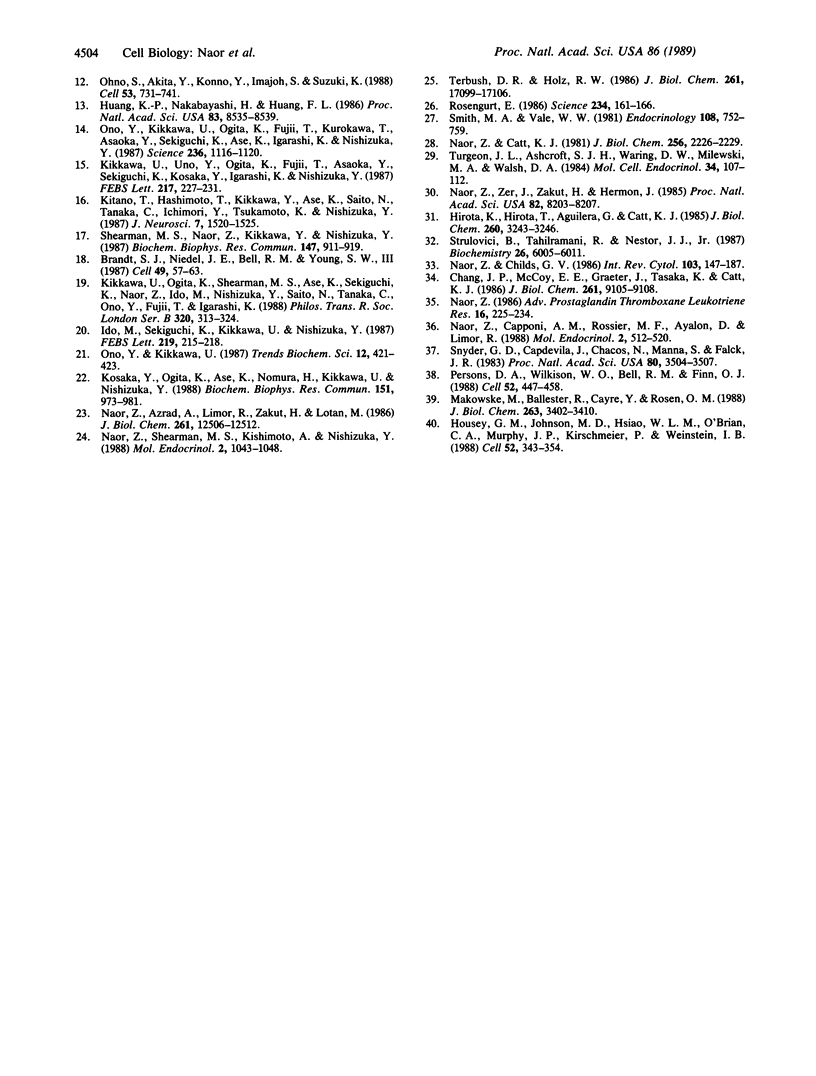Abstract
Protein kinase C is now recognized to comprise a family of closely related subspecies (PKCs). When cultured rat pituitary cells were permeabilized by digitonin for 5 min in the absence of Ca2+, endogenous PKC activity was decreased by 72%. PKC depletion was also achieved by prior treatment (24 hr) with high concentrations of phorbol 12-myristate 13-acetate (PMA). When purified activated brain PKCs were added for 30 min to PMA-pretreated, digitonin-permeabilized cells, only alpha- and beta- but not gamma-type PKC stimulated luteinizing hormone release. Since PKC was implicated as a mediator of gonadotropin secretion, gonadotropin-releasing hormone might utilize alpha- and beta-type PKCs for stimulation of gonadotropin secretion; alpha- and beta-type PKCs might participate also in other exocytotic responses in diverse biological systems in which PKC was implicated.
Full text
PDF



Selected References
These references are in PubMed. This may not be the complete list of references from this article.
- Brandt S. J., Niedel J. E., Bell R. M., Young W. S., 3rd Distinct patterns of expression of different protein kinase C mRNAs in rat tissues. Cell. 1987 Apr 10;49(1):57–63. doi: 10.1016/0092-8674(87)90755-0. [DOI] [PubMed] [Google Scholar]
- Chang J. P., McCoy E. E., Graeter J., Tasaka K., Catt K. J. Participation of voltage-dependent calcium channels in the action of gonadotropin-releasing hormone. J Biol Chem. 1986 Jul 15;261(20):9105–9108. [PubMed] [Google Scholar]
- Coussens L., Parker P. J., Rhee L., Yang-Feng T. L., Chen E., Waterfield M. D., Francke U., Ullrich A. Multiple, distinct forms of bovine and human protein kinase C suggest diversity in cellular signaling pathways. Science. 1986 Aug 22;233(4766):859–866. doi: 10.1126/science.3755548. [DOI] [PubMed] [Google Scholar]
- Hirota K., Hirota T., Aguilera G., Catt K. J. Hormone-induced redistribution of calcium-activated phospholipid-dependent protein kinase in pituitary gonadotrophs. J Biol Chem. 1985 Mar 25;260(6):3243–3246. [PubMed] [Google Scholar]
- Housey G. M., Johnson M. D., Hsiao W. L., O'Brian C. A., Murphy J. P., Kirschmeier P., Weinstein I. B. Overproduction of protein kinase C causes disordered growth control in rat fibroblasts. Cell. 1988 Feb 12;52(3):343–354. doi: 10.1016/s0092-8674(88)80027-8. [DOI] [PubMed] [Google Scholar]
- Housey G. M., O'Brian C. A., Johnson M. D., Kirschmeier P., Weinstein I. B. Isolation of cDNA clones encoding protein kinase C: evidence for a protein kinase C-related gene family. Proc Natl Acad Sci U S A. 1987 Feb;84(4):1065–1069. doi: 10.1073/pnas.84.4.1065. [DOI] [PMC free article] [PubMed] [Google Scholar]
- Huang K. P., Nakabayashi H., Huang F. L. Isozymic forms of rat brain Ca2+-activated and phospholipid-dependent protein kinase. Proc Natl Acad Sci U S A. 1986 Nov;83(22):8535–8539. doi: 10.1073/pnas.83.22.8535. [DOI] [PMC free article] [PubMed] [Google Scholar]
- Ido M., Sekiguchi K., Kikkawa U., Nishizuka Y. Phosphorylation of the EGF receptor from A431 epidermoid carcinoma cells by three distinct types of protein kinase C. FEBS Lett. 1987 Jul 13;219(1):215–218. doi: 10.1016/0014-5793(87)81219-x. [DOI] [PubMed] [Google Scholar]
- Kikkawa U., Ogita K., Shearman M. S., Ase K., Sekiguchi K., Naor Z., Ido M., Nishizuka Y., Saito N., Tanaka C. The heterogeneity and differential expression of protein kinase C in nervous tissues. Philos Trans R Soc Lond B Biol Sci. 1988 Jul 26;320(1199):313–324. doi: 10.1098/rstb.1988.0079. [DOI] [PubMed] [Google Scholar]
- Kikkawa U., Ono Y., Ogita K., Fujii T., Asaoka Y., Sekiguchi K., Kosaka Y., Igarashi K., Nishizuka Y. Identification of the structures of multiple subspecies of protein kinase C expressed in rat brain. FEBS Lett. 1987 Jun 15;217(2):227–231. doi: 10.1016/0014-5793(87)80668-3. [DOI] [PubMed] [Google Scholar]
- Kitano T., Hashimoto T., Kikkawa U., Ase K., Saito N., Tanaka C., Ichimori Y., Tsukamoto K., Nishizuka Y. Monoclonal antibodies against rat brain protein kinase C and their application to immunocytochemistry in nervous tissues. J Neurosci. 1987 May;7(5):1520–1525. doi: 10.1523/JNEUROSCI.07-05-01520.1987. [DOI] [PMC free article] [PubMed] [Google Scholar]
- Knopf J. L., Lee M. H., Sultzman L. A., Kriz R. W., Loomis C. R., Hewick R. M., Bell R. M. Cloning and expression of multiple protein kinase C cDNAs. Cell. 1986 Aug 15;46(4):491–502. doi: 10.1016/0092-8674(86)90874-3. [DOI] [PubMed] [Google Scholar]
- Kosaka Y., Ogita K., Ase K., Nomura H., Kikkawa U., Nishizuka Y. The heterogeneity of protein kinase C in various rat tissues. Biochem Biophys Res Commun. 1988 Mar 30;151(3):973–981. doi: 10.1016/s0006-291x(88)80461-3. [DOI] [PubMed] [Google Scholar]
- Kubo K., Ohno S., Suzuki K. Primary structures of human protein kinase C beta I and beta II differ only in their C-terminal sequences. FEBS Lett. 1987 Oct 19;223(1):138–142. doi: 10.1016/0014-5793(87)80524-0. [DOI] [PubMed] [Google Scholar]
- Makowske M., Ballester R., Cayre Y., Rosen O. M. Immunochemical evidence that three protein kinase C isozymes increase in abundance during HL-60 differentiation induced by dimethyl sulfoxide and retinoic acid. J Biol Chem. 1988 Mar 5;263(7):3402–3410. [PubMed] [Google Scholar]
- Makowske M., Birnbaum M. J., Ballester R., Rosen O. M. A cDNA encoding protein kinase C identifies two species of mRNA in brain and GH3 cells. J Biol Chem. 1986 Oct 15;261(29):13389–13392. [PubMed] [Google Scholar]
- Naor Z., Azrad A., Limor R., Zakut H., Lotan M. Gonadotropin-releasing hormone activates a rapid Ca2+-independent phosphodiester hydrolysis of polyphosphoinositides in pituitary gonadotrophs. J Biol Chem. 1986 Sep 25;261(27):12506–12512. [PubMed] [Google Scholar]
- Naor Z., Capponi A. M., Rossier M. F., Ayalon D., Limor R. Gonadotropin-releasing hormone-induced rise in cytosolic free Ca2+ levels: mobilization of cellular and extracellular Ca2+ pools and relationship to gonadotropin secretion. Mol Endocrinol. 1988 Jun;2(6):512–520. doi: 10.1210/mend-2-6-512. [DOI] [PubMed] [Google Scholar]
- Naor Z., Catt K. J. Mechanism of action of gonadotropin-releasing hormone. Involvement of phospholipid turnover in luteinizing hormone release. J Biol Chem. 1981 Mar 10;256(5):2226–2229. [PubMed] [Google Scholar]
- Naor Z., Childs G. V. Binding and activation of gonadotropin-releasing hormone receptors in pituitary and gonadal cells. Int Rev Cytol. 1986;103:147–187. doi: 10.1016/s0074-7696(08)60835-9. [DOI] [PubMed] [Google Scholar]
- Naor Z. Phosphoinositide turnover, Ca2+ mobilization, protein kinase C activation and leukotriene action in pituitary signal transduction: effect of gonadotropin releasing hormone. Adv Prostaglandin Thromboxane Leukot Res. 1986;16:225–234. [PubMed] [Google Scholar]
- Naor Z., Shearman M. S., Kishimoto A., Nishizuka Y. Calcium-independent activation of hypothalamic type I protein kinase C by unsaturated fatty acids. Mol Endocrinol. 1988 Nov;2(11):1043–1048. doi: 10.1210/mend-2-11-1043. [DOI] [PubMed] [Google Scholar]
- Naor Z., Zer J., Zakut H., Hermon J. Characterization of pituitary calcium-activated, phospholipid-dependent protein kinase: redistribution by gonadotropin-releasing hormone. Proc Natl Acad Sci U S A. 1985 Dec;82(23):8203–8207. doi: 10.1073/pnas.82.23.8203. [DOI] [PMC free article] [PubMed] [Google Scholar]
- Nishizuka Y. The molecular heterogeneity of protein kinase C and its implications for cellular regulation. Nature. 1988 Aug 25;334(6184):661–665. doi: 10.1038/334661a0. [DOI] [PubMed] [Google Scholar]
- Ohno S., Akita Y., Konno Y., Imajoh S., Suzuki K. A novel phorbol ester receptor/protein kinase, nPKC, distantly related to the protein kinase C family. Cell. 1988 Jun 3;53(5):731–741. doi: 10.1016/0092-8674(88)90091-8. [DOI] [PubMed] [Google Scholar]
- Ohno S., Kawasaki H., Imajoh S., Suzuki K., Inagaki M., Yokokura H., Sakoh T., Hidaka H. Tissue-specific expression of three distinct types of rabbit protein kinase C. Nature. 1987 Jan 8;325(7000):161–166. doi: 10.1038/325161a0. [DOI] [PubMed] [Google Scholar]
- Ono Y., Fujii T., Ogita K., Kikkawa U., Igarashi K., Nishizuka Y. Identification of three additional members of rat protein kinase C family: delta-, epsilon- and zeta-subspecies. FEBS Lett. 1987 Dec 21;226(1):125–128. doi: 10.1016/0014-5793(87)80564-1. [DOI] [PubMed] [Google Scholar]
- Ono Y., Kikkawa U., Ogita K., Fujii T., Kurokawa T., Asaoka Y., Sekiguchi K., Ase K., Igarashi K., Nishizuka Y. Expression and properties of two types of protein kinase C: alternative splicing from a single gene. Science. 1987 May 29;236(4805):1116–1120. doi: 10.1126/science.3576226. [DOI] [PubMed] [Google Scholar]
- Ono Y., Kurokawa T., Fujii T., Kawahara K., Igarashi K., Kikkawa U., Ogita K., Nishizuka Y. Two types of complementary DNAs of rat brain protein kinase C. Heterogeneity determined by alternative splicing. FEBS Lett. 1986 Oct 6;206(2):347–352. doi: 10.1016/0014-5793(86)81010-9. [DOI] [PubMed] [Google Scholar]
- Ono Y., Kurokawa T., Kawahara K., Nishimura O., Marumoto R., Igarashi K., Sugino Y., Kikkawa U., Ogita K., Nishizuka Y. Cloning of rat brain protein kinase C complementary DNA. FEBS Lett. 1986 Jul 28;203(2):111–115. doi: 10.1016/0014-5793(86)80724-4. [DOI] [PubMed] [Google Scholar]
- Parker P. J., Coussens L., Totty N., Rhee L., Young S., Chen E., Stabel S., Waterfield M. D., Ullrich A. The complete primary structure of protein kinase C--the major phorbol ester receptor. Science. 1986 Aug 22;233(4766):853–859. doi: 10.1126/science.3755547. [DOI] [PubMed] [Google Scholar]
- Persons D. A., Wilkison W. O., Bell R. M., Finn O. J. Altered growth regulation and enhanced tumorigenicity of NIH 3T3 fibroblasts transfected with protein kinase C-I cDNA. Cell. 1988 Feb 12;52(3):447–458. doi: 10.1016/s0092-8674(88)80037-0. [DOI] [PubMed] [Google Scholar]
- Rozengurt E. Early signals in the mitogenic response. Science. 1986 Oct 10;234(4773):161–166. doi: 10.1126/science.3018928. [DOI] [PubMed] [Google Scholar]
- Shearman M. S., Naor Z., Kikkawa U., Nishizuka Y. Differential expression of multiple protein kinase C subspecies in rat central nervous tissue. Biochem Biophys Res Commun. 1987 Sep 30;147(3):911–919. doi: 10.1016/s0006-291x(87)80157-2. [DOI] [PubMed] [Google Scholar]
- Smith M. A., Vale W. W. Desensitization to gonadotropin-releasing hormone observed in superfused pituitary cells on Cytodex beads. Endocrinology. 1981 Mar;108(3):752–759. doi: 10.1210/endo-108-3-752. [DOI] [PubMed] [Google Scholar]
- Snyder G. D., Capdevila J., Chacos N., Manna S., Falck J. R. Action of luteinizing hormone-releasing hormone: involvement of novel arachidonic acid metabolites. Proc Natl Acad Sci U S A. 1983 Jun;80(11):3504–3507. doi: 10.1073/pnas.80.11.3504. [DOI] [PMC free article] [PubMed] [Google Scholar]
- Strulovici B., Tahilramani R., Nestor J. J., Jr Phosphorylation substrates for protein kinase C in intact pituitary cells: characterization of a receptor-mediated event using novel gonadotropin-releasing hormone analogues. Biochemistry. 1987 Sep 22;26(19):6005–6011. doi: 10.1021/bi00393a009. [DOI] [PubMed] [Google Scholar]
- TerBush D. R., Holz R. W. Effects of phorbol esters, diglyceride, and cholinergic agonists on the subcellular distribution of protein kinase C in intact or digitonin-permeabilized adrenal chromaffin cells. J Biol Chem. 1986 Dec 25;261(36):17099–17106. [PubMed] [Google Scholar]
- Turgeon J. L., Ashcroft S. J., Waring D. W., Milewski M. A., Walsh D. A. Characteristics of the adenohypophyseal Ca2+-phospholipid-dependent protein kinase. Mol Cell Endocrinol. 1984 Feb;34(2):107–112. doi: 10.1016/0303-7207(84)90061-3. [DOI] [PubMed] [Google Scholar]


